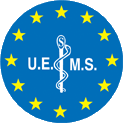Myocardial Perfusion Imaging with special consideration of pharmacological stress agents
1
cme-Credit
Learning Targets
|
||
Lecture BoardPrim. Univ.-Doz. Dr. Alexander Becherer |
Accreditation InformationThe e-learning activity “Myocardial Perfusion Imaging with special consideration of pharmacological stress agents” is accredited by the European Accreditation Council for Continuing Medical Education (EACCME) to provide the following CME activity for medical specialists. The e-learning activity is awarded with 1 European CME credit (ECMEC’s). 
|
|
|
kindly supported by 
|
||















